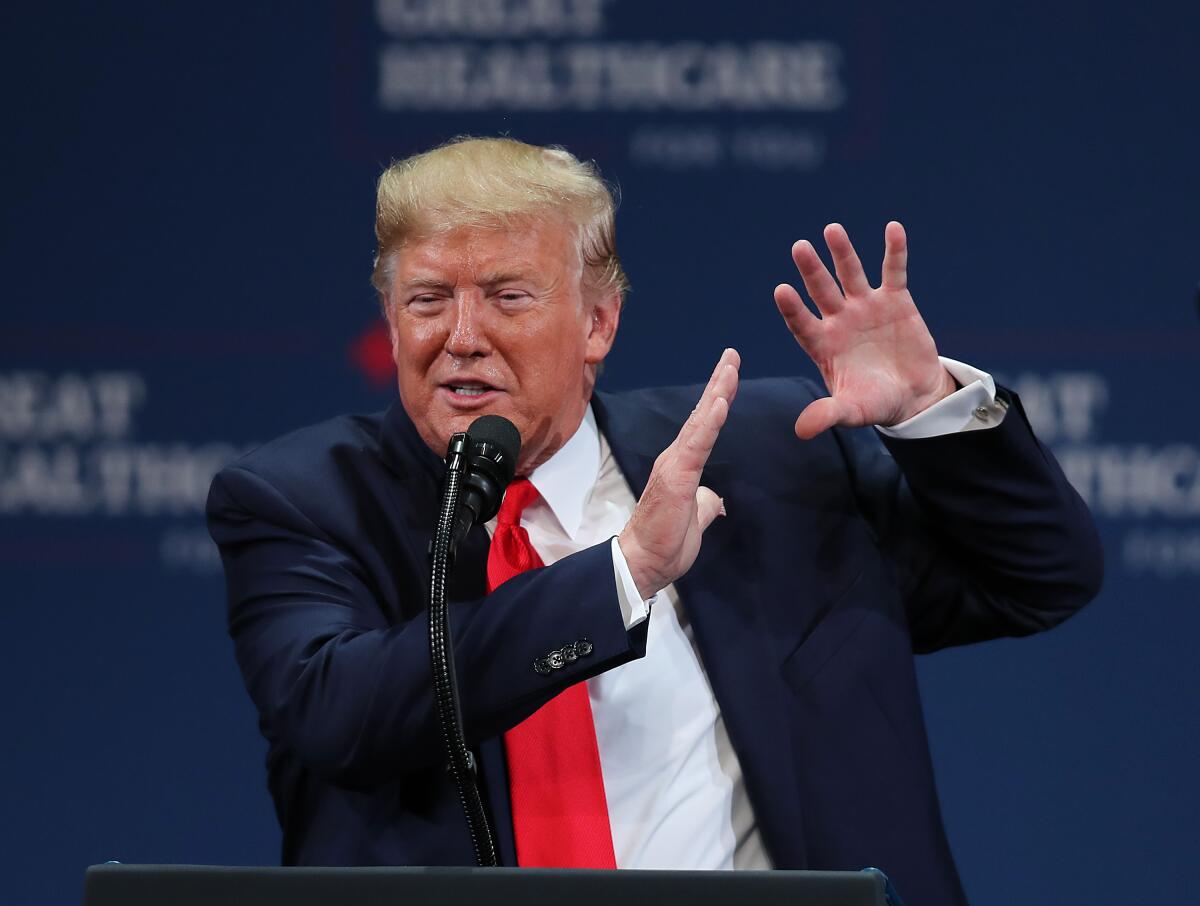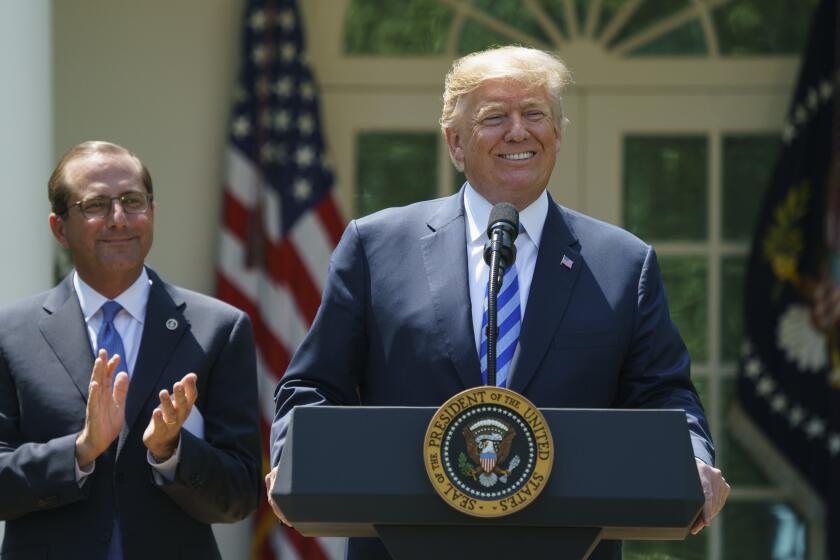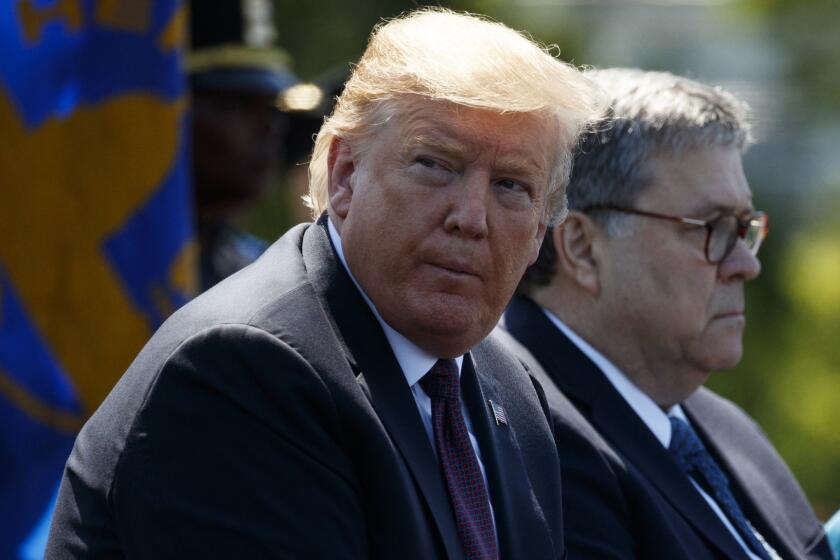Column: Trump runs dry on healthcare ideas, promotes wellness programs known to be useless

- Share via
The Trump administration is known for its paucity of good ideas on healthcare, beyond threatening to throw 20 million Americans off their coverage with the stroke of a federal appeals court’s pen.
It’s chock full of bad ideas on healthcare, however. On Monday, Trump’s health advisors unveiled another one: Promoting “wellness” programs in the individual healthcare markets.
According to the Centers for Medicare and Medicaid Services, which is managing this project, the idea is to allow up to 10 states to apply to add wellness programs to their Affordable Care Act health plans.
The evidence does not support the unbridled enthusiasm for wellness programs that has swept the country.
— Researcher Nicholas Bagley, et al.
This is a “demonstration project,” with the goal of showing that giving incentives for people “to choose to engage in healthy activities” leads to “better health outcomes.”
It’s hard to figure out what the government expects to learn from this that isn’t already known. The verdict on wellness programs has been in for several years, based on the fad for them among big employers. The verdict is clear: They don’t work.
Wellness programs typically grant employees benefits, including discounts on their health coverage, for undergoing health screening, taking smoking cessation or nutrition classes, or getting more exercise. (This is functionally equivalent to imposing a penalty on those who don’t take these steps.)
President Trump was showered in praise Wednesday when he unveiled an initiative to fix the country’s wretched and ridiculously expensive system for dealing with kidney disease.
Study after study has shown that the programs don’t produce healthcare savings, better health or improved work performance. One trial reported this year involving 33,000 employees of BJ’s Wholesale Club, a big East Coast warehouse retailer, found “no significant differences in ... self-reported health and behaviors; clinical markers of health; healthcare spending or utilization; or absenteeism, tenure or job performance after 18 months.”
A similar study published in 2018 of 12,000 workers in Illinois came to a nearly identical conclusion: “We do not find significant causal effects of treatment on total medical expenditures, health behaviors, employee productivity or self-reported health status in the first year.”
Some studies have found some savings associated with wellness programs, including a study at Pepsico covering 2003-2011. But the savings there and at other employers were associated not with the healthy-lifestyle component of the programs, but with disease management.
At Pepsico, employees got up-close-and-personal disease management if they had one of 10 chronic conditions, including asthma, diabetes, chronic obstructive pulmonary disease, hypertension or lower back pain.
As workplace wellness programs have gained popularity among employers, questions about their effectiveness and drawbacks have proliferated.
Disease management is a well-understood technique for reducing healthcare costs for the affected patients; it doesn’t need to be part of a wellness program and it doesn’t require dispensation from the government to be part of a healthcare plan.
The government initiative appears to be focused on lifestyle changes, not disease management — the official release mentions providing consumers with “incentives to make healthier choices” and “‘health-contingent’ wellness programs.”
“Some wellness programs that focus on managing chronic illnesses may be effective, but the lifestyle management programs that are now ubiquitous in the American workplace almost certainly are not,” wrote Nicholas Bagley of the University of Michigan and his colleagues Adrianna McIntyre, Austin Frakt and Aaron Carroll in 2017: “The evidence does not support the unbridled enthusiasm for wellness programs that has swept the country.”
What researchers have found, however, is that wellness programs can function as a “screening mechanism,” as the Illinois researchers observed: “Even in the absence of any direct savings, differential recruitment or retention of lower-cost participants could result in net savings for employers.”
That makes wellness programs potential violations of a raft of federal laws prohibiting discrimination in the workplace, such as the Americans With Disabilities Act.
We’ve compiled a list of the 10 worst Trump actions on healthcare so the cumulative impact is clearer.
The Affordable Care Act recognized the reality that wellness programs are popular among employers by allowing them to continue, albeit with limits on the rewards/penalties that can be used to goad workers into joining. But the ACA didn’t endorse adding wellness components to non-employer health plans in the individual market. That’s what Trump is aiming to change.
The wellness initiative reflects the characteristic flailing of the Trump administration when it comes to healthcare policy. As I reported in May, Trump’s vaunted initiative to help kidney disease patients by increasing kidney transplants depends for its implementation on the Affordable Care Act — which Trump is angling to have overturned in federal court.
On Thursday, Trump journeyed to Florida to a retirement community to promote for-profit Medicare Advantage plans, using the occasion to bash progressive campaigns for “Medicare for All.” But Medicare Advantage plans, through which private companies take over the administration of Medicare benefits from the government, have been criticized for overcharging the government and for restricting enrollees to narrow networks of doctors and hospitals that may not be able to provide all the care seniors need.
“Medicare Advantage is a hustle designed to allow for-profit corporations to suck up public dollars,” Nancy Altman, president of the advocacy group Social Security Works, said after the Trump event. “Medicare Advantage is stealth privatization intended to undermine traditional Medicare.”
Trump’s position on the notorious Texas-led attack on Obamacare would be disastrous for employer-sponsored health plans.
The wellness initiative is especially half-baked. Health insurance expert David Anderson of Duke University observes that the lifestyle component of the programs gained popularity among big employers because it was “facially plausible. ... Getting people to walk more, go to the gym a couple of days a week and show lower blood pressure readings after six months or a year could theoretically lead to lower costs and healthier people.”
But those gains simply never materialized. The programs turned out to be “a good way of shifting net costs to sicker folks” while delivering benefits to those who didn’t need them. Studies have found that the most enthusiastic enrollees in the programs are those who already shun smoking, watch their weight and try to eat healthy.
“Most of the benefits go to people who don’t need to change their behavior,” Anderson writes. The costs fall on those with preexisting conditions, who may not be able to utilize the lifestyle incentives, since “the people who are most likely not participating in wellness programs are those with significant health expenses and barriers to access.”
Whether any state will take Trump up on his invitation to join the demonstration program isn’t clear. The administrative burdens that come with the invitation are weighty. States would have to show that the program “will not result in any decrease in coverage or increase in cost to the federal government. ... States must also ensure that their wellness programs do not discriminate based on health status.”
That’s a sizable ask in return for creating a program that doesn’t work. But the administration portrayed the offer as “another example of President Trump’s commitment to driving better health outcomes by offering states new flexibility to innovate,” as Seema Verma, Centers for Medicare and Medicaid Services administrator, put it. So there may be some states misinformed enough to take him at his word.
More to Read
Inside the business of entertainment
The Wide Shot brings you news, analysis and insights on everything from streaming wars to production — and what it all means for the future.
You may occasionally receive promotional content from the Los Angeles Times.













